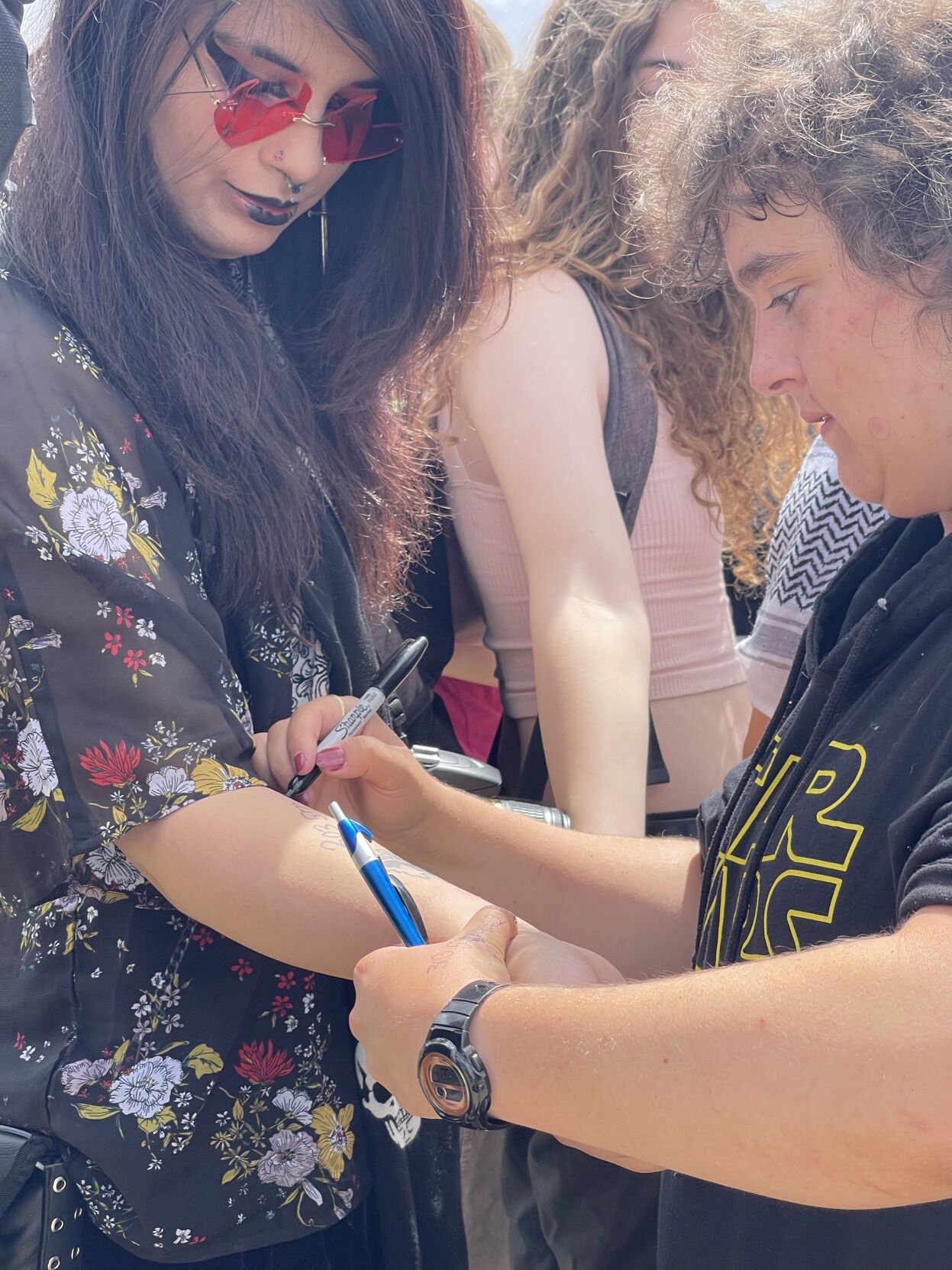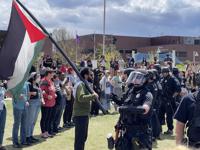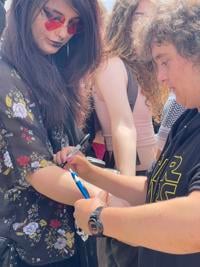Denver protesters arrested as police dismantle encampment on Auraria Campus
The clashes with police and arrests of pro-Palestinian protesters that have erupted in colleges across the nation were on full display on Friday, when Denver officers cleared an encampment and arrested more than two dozen protesters on a campus shared by three universities.
And just as university officials elsewhere in the country struggle to respond, the protest appears to have left Colorado administrators scrambling to figure out how to deal with the activists.

A protester carrying a Palestinian flag confronts a Denver police officer during a clash on Friday April 26, 2024 on the Auraria Campus that saw more than two dozen arrested.
Nicole C. Brambila nico.brambila@denvergazette.com

A protester carrying a Palestinian flag confronts a Denver police officer during a clash on Friday April 26, 2024 on the Auraria Campus that saw more than two dozen arrested.
One crucial difference, however, is that in the case of the Auraria protest, university officials did not take days before deciding how to respond. The protesters had erected tents on Thursday. By Friday afternoon, the police moved in to dismantle them and arrest about two dozen protesters. By contrast, the tents are still up at Columbia University, more than a week after police arrested roughly 100 protesters. The protesters there said they had reached an impasse with university administrators and intended to continue their encampment.
It appears that some university officials here did not anticipate that the rallies in New York, Michigan and other universities would spill over into Colorado, despite the nearly 30 protests on the Auraria Campus since the Oct. 7 Hamas attack that killed 1,200 in southern Israel and prompted retaliatory strikes from Israel. In the attack that sparked the war, Hamas also kidnapped 250 people and Israel said the group still holds around 100 hostages and the remains of more than 30 others. Meanwhile, more than 34,000 Palestinians have been killed in Israel’s offensive, according to the Health Ministry in Hamas-run Gaza.
In the days leading up to students erecting tents on the lawn of the Tivoli quad of the Auraria Campus, officials appeared to dismiss the idea that the unrest seen elsewhere in the country would break out in Colorado. The Denver Gazette had reached out to several universities across the state to inquire about how administrations might respond to a similar protests in Colorado.
On the morning of the protest — before the activists erected more than a dozen tents — Jeff Howard, the spokesman for the University of Colorado, told The Denver Gazette that the preparation question was “NA” — not applicable.

A student protester uses a Sharpie pen to write the phone for legal aid on another person’s arm on Friday April 26, 2023.
Nicole C. Brambila nico.brambila@denvergazette.com

A student protester uses a Sharpie pen to write the phone for legal aid on another person’s arm on Friday April 26, 2023.
After discussion with students that included Angie Paccione, the executive director of the Colorado Department of Higher Education, and a member of the governor’s cabinet broke down, police tore down the makeshift encampment and arrested protesters.
In a statement, the Auraria Higher Education Center defended the decision by noting a campus policy that prohibits camping on the premises. Campus authorities also suggested that “national disruptors” had infiltrated the protest.
“We fully support the right of students to assemble peacefully,” Auraria campus officials said in a statement. “Still, it’s essential to note that Auraria Campus policy prohibits camping on the premises because of health, safety, and security considerations.”
The Auraria Campus includes CU Denver, Metropolitan State University of Denver (MSU) and the Community College of Denver.
Howard characterized the majority of the protests held on campus as small but noted eight of the rallies drew 50 or more people and the largest 160 protesters. The Auraria protest, which began Thursday, attracted hundreds of people.
Others, though, were not surprised protesters in Denver would mimic the rallies that have nabbed headlines for the past week.
‘Our top priority is always the safety of our students’
Scott Levin, regional director of the Anti-Defamation League Mountain States Region, said the Auraria Campus has been a hub for political activism against Israel for years.
“I think the encampments are likely to get worse before this gets better,” Levin said.
The pro-Palestinian rallies unfolding on colleges campuses across the U.S., Levin said, are “frightening to Jews.”
A recent survey of college students by the Anti-Defamation League and Hillel International found — prior to Oct. 7 — that some 67% of Jewish students felt physically safe on campus. After Oct. 7, that dropped to 46%.
Jews hear a clear demand for Israel’s annihilation in the chant: “From the river to the sea, Palestine will be free.” The river is the Jordan and the sea is the Mediterranean, between which lie Israel and the Palestinian territories.
Activists, however, say it’s a call for peace and equality after 75 years of an Israeli statehood and military rule over millions of Palestinians.
Students at the rally Thursday night confirmed that their protest was in solidarity with protesters on campuses across the nation.
On Wednesday — the day before the first tent stakes were pressed into the ground — Tim Carroll, an MSU spokesperson, said that the university was “monitoring protest activity happening on college campuses nationwide and reviewing policies and training so that we can be best prepared to ensure a safe environment here.”
“Our top priority is always the safety of our students and community, and we will continue to collaborate with our partners at the Auraria Campus Police Department to ensure the well-being of students, employees and visitors,” Carroll said in an email to The Denver Gazette.
Caroll added: “Our role is to educate and provide forums for learning by engaging in thoughtful, respectful dialogue, and we will continue to foster civil discourse while ensuring safety and our academic mission are maintained.”
In the wake of the Hamas attacks, officials have taken proactive steps, such as a letter from MSU President Janine Davidson in the fall reminding students of the importance of civil discourse.
“I know that emotions are especially raw right now; and when passions run high, it’s easy to dismiss others, or make them into objects of contempt,” Davidson wrote. “So let me be clear: while we support the free expression of opinions, discrimination, bullying and threats of violence cannot be tolerated.”
An Auraria Higher Education Center reminder online also warned students that assemblies are prohibited in campus buildings.
“Persons refusing to vacate premises upon request are subject to immediate suspension of activities and arrest under applicable municipal and state laws,” the Auraria Campus Police Department statement said.
Colorado Christian University: ‘We never want to forget our Jewish roots’
While Denver campuses have been a hotbed for student protests, the rallies have not been widespread.
Neither the University of Northern Colorado in Greeley nor the Colorado Christian University in Lakewood reported students holding pro-Palestinian rallies.
A faith-based institution, Colorado Christian University Chancellor Donald W. Sweeting said he did not expect to see protests on his campus.
A university spokesperson said that students are required to sign a statement of faith when enrolling, which means the student population is more likely to hew to Christian teachings and be sympathetic to Israel.
“We never want to forget our Jewish roots as a Christian University,” Sweeting said.
Sweeting added: “The worst thing to happen to Palestinians is to have Hamas rule over them.”
Last December, Colorado Christian University hosted local Jewish leaders over dinner and a prayer vigil, in which faculty members and students expressed support for Israel in its war against Hamas. During the fundraiser, two Israeli students spoke about the support they are getting from faculty members and students alike, and a student leader reiterated that support to the Israeli students and to the fundraiser’s Jewish attendees.
“Tonight, I stand before you publicly as the president of this university,” Eric Hogue told the attendees. “I promise you — this university will continue to support Israel, her land, her state and her people. You are home at CCU tonight.”
ACLU: ‘Arresting peaceful protestors’ will escalate tensions
In an open letter to university presidents on Friday, the ACLU warned that schools should not single out students with a particular viewpoint nor censor, discipline or disproportionately punish them.
Police — the ACLU argued — should only be employed as a last resort.
“Inviting armed police into a campus protest environment, even a volatile one, can create unacceptable risks for all students and staff,” the ACLU said.
“University officials must also be cognizant of the history of law enforcement using inappropriate and excessive force on communities of color, including Black, Brown, and immigrant students. Moreover, arresting peaceful protestors is also likely to escalate, not calm, the tensions on campus — as events of the past week have made abundantly clear.”
The decision to arrest Denver protesters has followed similar scenes unfolding at college campuses across the country.
More than 100 pro-Palestinian protesters were arrested at Columbia University in New York, prompting the Ivy League school to cancel in-person classes.
And at Michigan State University, students set up an encampment on campus to pressure the university to divest — the same demand the protesters in Denver made — from Israeli companies and for the U.S. government to stop backing Israel’s military.
Shannon Birch, a Colorado State University senior, said having watched in horror the slaughter of innocent civilians, she had to do something. Showing up at the rally — she and other protesters said — was the least she could do.
“For months and months I’ve been watching children being killed with our money,” Birch said.
Denver Mayor Mike Johnston fails to convince protesters to dismantle tents
On Friday, Denver Mayor Mike Johnston went to the Auraria Campus in an attempt to persuade the protesters to voluntarily dismantle their tents.
“We are here to try to make sure we can help you all exercise your right to protest peacefully,” he said.
To do that, the mayor said, the campus must be able to continue to operate.
Johnston was interrupted several times.
Denver’s Democratic mayor tells illegal Palestinian tent city occupiers that they have 30 minutes to tear down their illegal tents or they will be arrestedProtesters call him a “fascist”Amazing pic.twitter.com/sazVFTPm8Y
— Matthew Foldi (@MatthewFoldi) April 27, 2024
“Do you support genocide?” the protesters asked the mayor.
“I’m going to talk for 60 seconds and I’ll walk. If you want to listen, you can. If not, that’s your choice,” Johnston replied.
Johnston told the protesters that erecting the tents violates campus policy, and that if they took them down within the next 30 minutes, they could continue to protest, adding, “We have no desire to make arrests.”
“It’s more of the same. Our demands are not being met,” one protester told Johnston, who replied, “I have no capacity to meet any of your demands.”
As Johnston walked away, one of the protesters yelled, “You (expletive) fascist.”
The Associated Press contributed to this report.
Denver Mayor Mike Johnston called 'fascist' as he tries to convince protesters to dismantle tents






